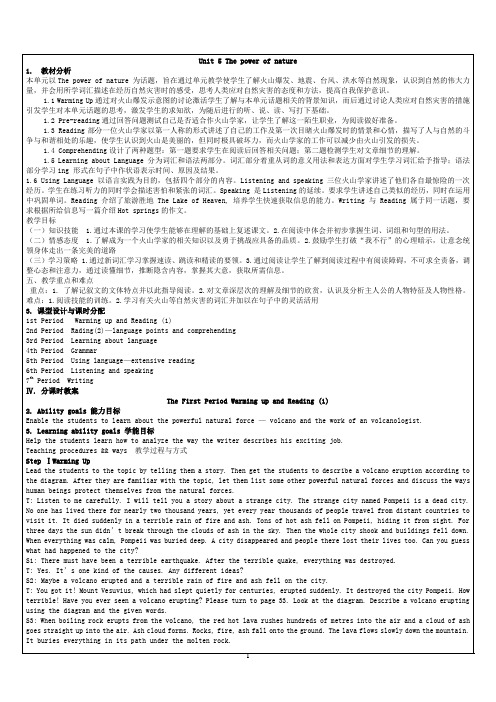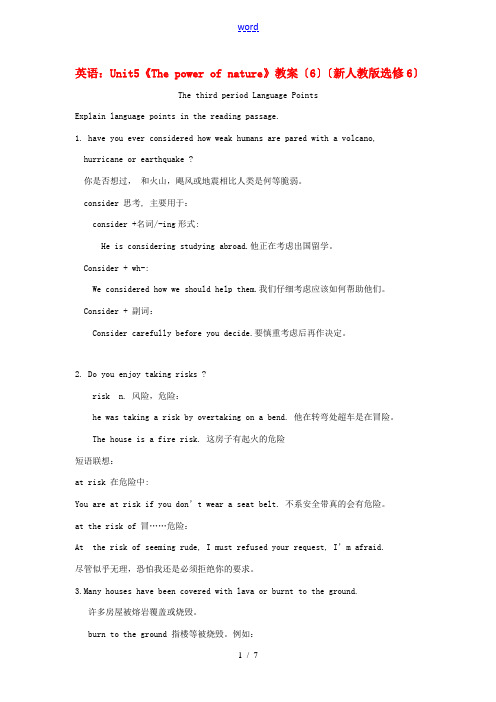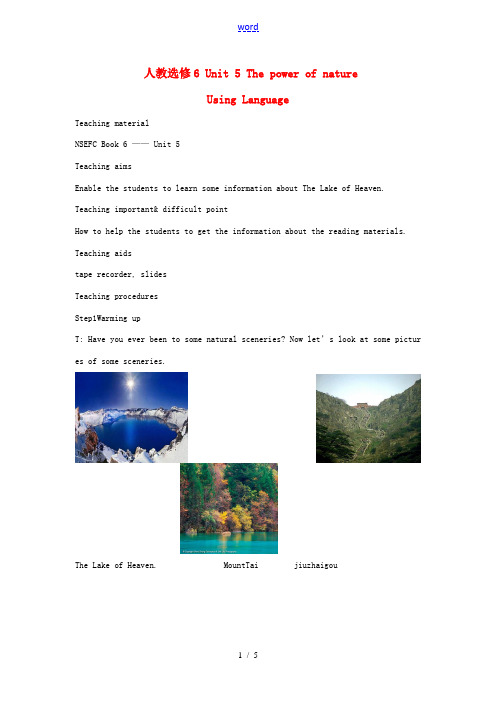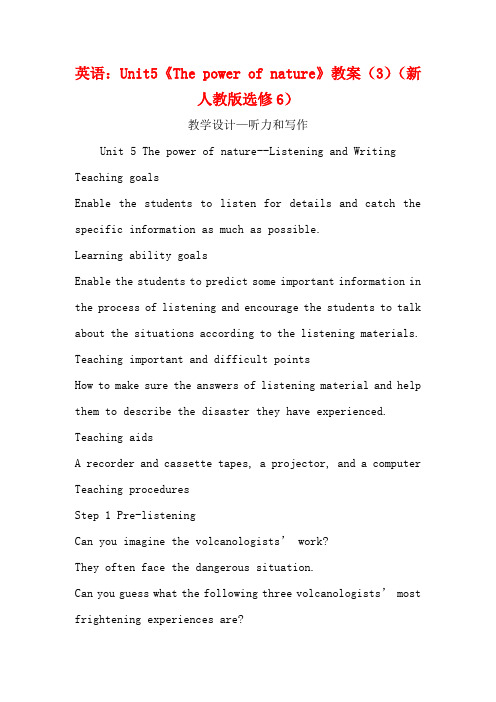新课标人教版选修六教案Unit 5 The power of nature
Unit-5--The-Power-of-Nature-(单元)教案--(人教版选修6)

Unit 5 The Power of Nature (单元)教案(人教版选修6)Period 1 Warming up and readingTeaching goals:1.To have the students get a general idea of natural disasters.2.To help the students develop speaking ability.3.To improve the students’ reading abilities.4.To help the students to know how to summarize a text or a paragraph.Step1 Warming up1. Ask students to list other natural disasters, such as hurricane,earthquakes, volcano, etc. Show the pictures of these natural disasters.2. Introduction to volcanoVolcano is one of these natural disasters. We should also do something to avoid its eruption or reduce its damage to us.What do you know about volcanoesHow is a volcano formedHow does a volcano erupt3. Discuss about the measures that we should take to avoid natural disasters.We can find how powerful nature is and how weak humans are compared with a volcano, hurricane, earthquake or other natural disasters. But we are not completely powerless. We can take measures to protect ourselves from powerful natural forces. What measures should we takeStep2 Pre-readingIf we can predict the eruption of volcanoes, we can reduce its damage to us. So we need volcanologists to study volcanoes.Do you want to be a volcanologist WhyIf you are a volcanologist, what kind of danger will you meet (what kind of work should you do)Let’s learn something about volcanologists in the text.Step 3 Skimming1. Read through the passage quickly and find out the answers to the questions. What kind of things should a volcanologist doWhat is the volcanologist wearing when getting close to the crater2. Divide the passage into several parts and find out the main idea of each part. Step 4 ScanningScan the passage .Read the passage carefully and answer the following questions.1.Why is a volcanologist’s job important2.Where is Mount Kilauea3.Why is the lava that flows on Mount Kilauea more dangerous than the actualeruption4.What caused the writer’s bedroom to become as bright as day even though it wasnight5.Why did the scientists have to get close to the volcano after it began erupting6.Why was it difficult for the writer to walk towards the edge of the crater7.What does the writer find impressive about volcanoes even after studying themfor 20 yearsStep 5 DiscussionT1 Do you think it is an occupation you would enjoy Discuss your reasons with your classmates.T2 InterviewMake up an interview. Four students as a group. One student acts as the writer of the passage. The other three students act as the journalists from three different TV stations.Step 6 Homework:Spend some time researching one disaster. You can use books, magazines, newspapersor the Internet. Collect pictures and diagram and look for information about:• what causes this kind of disaster• actual events that h appened in the past in china and/or the rest of the world • how people helped the victims• what is being done to prevent the disaster happening again or to lessen the damagePeriod 2 Learning about LanguageTeaching goals:1.To help the students to learn how to use words and expressions.2.To review the V-ing form and learn the perfect V-ing form.Step 1 Discover useful words and expressions1.Show the video of an episode of Vesuvius eruption and ask students to fill in thetext with proper words.The eruption of Mount Vesuvius in 79AD took people in Pompeii by surprise. It was so quick and so severe that the town was soon covered in ________ and ________. Many houses in the town were ________. It was an ________ disaster for many people who could not get away in time. A writer named Pliny, who was there during the _______, described how lava was thrown into the air like a ________. ________ many of the townspeople, ________ at the ________ sight of Vesuvius eruption, stayed too long and failed to escape in time.2.Find suitable words or expressions from the texts in the unit to fill in the blankson page35.Step2 Grammar1.Show a flash to review the differences between V-ing and the past participle.a.现在分词表示主动,过去分词表示被动。
人教版高二英语选修6_Unit_5_The_power_of_nature_全单元教案

Unit 5 The power of nature1.教材分析本单元以The power of nature 为话题,旨在通过单元教学使学生了解火山爆发、地震、台风、洪水等自然现象,认识到自然的伟大力量,并会用所学词汇描述在经历自然灾害时的感受,思考人类应对自然灾害的态度和方法,提高自我保护意识。
1.1 Warming Up通过对火山爆发示意图的讨论激活学生了解与本单元话题相关的背景知识,而后通过讨论人类应对自然灾害的措施引发学生对本单元话题的思考,激发学生的求知欲,为随后进行的听、说、读、写打下基础。
1.2 Pre-reading通过回答问题测试自己是否适合作火山学家,让学生了解这一陌生职业,为阅读做好准备。
1.3 Reading部分一位火山学家以第一人称的形式讲述了自己的工作及第一次目睹火山爆发时的情景和心情,描写了人与自然的斗争与和谐相处的乐趣,使学生认识到火山是美丽的,但同时极具破坏力,而火山学家的工作可以减少由火山引发的损失。
1.4 Comprehending设计了两种题型:第一题要求学生在阅读后回答相关问题;第二题检测学生对文章细节的理解。
1.5 Learning about Language 分为词汇和语法两部分。
词汇部分着重从词的意义用法和表达方面对学生学习词汇给予指导;语法部分学习ing 形式在句子中作状语表示时间、原因及结果。
1.6 Using Language以语言实践为目的,包括四个部分的内容。
Listening and speaking 三位火山学家讲述了他们各自最惊险的一次经历。
学生在练习听力的同时学会描述害怕和紧张的词汇。
Speaking 是Listening的延续。
要求学生讲述自己类似的经历,同时在运用中巩固单词。
Reading 介绍了旅游胜地 The Lake of Heaven, 培养学生快速获取信息的能力。
Writing 与Reading 属于同一话题,要求根据所给信息写一篇介绍Hot springs的作文。
Thepowerofnature--UsingLanguage教案(新人教版选修6Unit5)

The power of nature--Using Language教案(新人教版选修6 Unit 5)Teaching materialNSEFC Book 6 —— Unit 5Teaching aimsEnable the students to learn some information about The Lake of Heaven.Teaching important& difficult pointHow to help the students to get the information about the reading materials.Teaching aidstape recorder, slidesTeaching proceduresStep1 Warming upT: Have you ever been to some natural sceneries? Now let’s look at some pictures of some sceneries.The Lake of Heaven. Mount Tai jiuzhaigouMount Huang fuxianhu the west lakeStep 2 Fast readingRead the text quickly and find out the key words(关键词)of each paragraph.Paragraph 1 ChangbaishanParagraph 2 TianchiParagraph 3 storiesParagraph 4 coinStep 3 Careful ReadingRead the passage carefully and finish the following tasks. Paragraph 1 ChangbaishanParagraph 2 TianchiParagraph 3 Fill in the blanks with some persons or animals to complete the chart.Three young women bathingfrom heaven a birdflewThe Manchupeopledropped father fruitA handsome gave birth toboy swallowed The youngest girlpregnantParagraph 4 coinYou and your ______ one drop a ____ into the clear, blue water to ________ your love will be as _____ and _______ as the lake. Keys: loved; coin; guarantee; deep; lastingStep 4 Detailed reading1. In what province is Changbaishan?In Jilin Province.What is a nature reserve? Why is Changbaishan a famous nature reserve?A place kept in its natural state for people to enjoy. The largest one in China.What is the most popular tourist attraction in the reserve? Tianchi, or the Lake of Heaven.4. What does Tianchi mean? How is Tianchi formed?The Lake of Heaven. In the crater of a dead volcano.5. What is the connection between the Manchu people and Tianchi? The story of the father of Manchu people.Step 5 DiscussionIf you were a tourist guide(导游), how would you introduce the Lake of Heaven in Changbaishan to the tourists?ChangbaishanTianchistorycoinThe Lake of Heavenin its four seasonsSpring summer autumn winterStep 6 HomeworkSurf the Internet to find more information about the Lake of Heaven.。
高中英语 Unit5《The power of nature》教案(6) 新人教版选修6

英语:Unit5《The power of nature》教案〔6〕〔新人教版选修6〕The third period Language PointsExplain language points in the reading passage.1. have you ever considered how weak humans are pared with a volcano,hurricane or earthquake ?你是否想过,和火山,飓风或地震相比人类是何等脆弱。
consider 思考, 主要用于:consider +名词/-ing形式:He is considering studying abroad.他正在考虑出国留学。
Consider + wh-:We considered how we should help them.我们仔细考虑应该如何帮助他们。
Consider + 副词:Consider carefully before you decide.要慎重考虑后再作决定。
2. Do you enjoy taking risks ?risk n. 风险,危险:he was taking a risk by overtaking on a bend. 他在转弯处超车是在冒险。
The house is a fire risk. 这房子有起火的危险短语联想:at risk 在危险中:You are at risk if you don’t wear a seat belt. 不系安全带真的会有危险。
at the risk of 冒……危险:At the risk of seeming rude, I must refused your request, I’m afraid.尽管似乎无理,恐怕我还是必须拒绝你的要求。
3.Many houses have been covered with lava or burnt to the ground.许多房屋被熔岩覆盖或烧毁。
人教版高中英语选修六Unit+5+The+power+of+nature+教案.doc

Unit 5 The power of nature教学目标(一)知识技能目标:学生在原有非谓语动词的知识基础上,归纳总结现在分词完成式的语法规则及其在句中的功能,并能够通过“输出”环节运用目标语言表达相关主题。
(二)过程方法目标:学生积极参加课堂活动,体现以学生为中心的课堂教学目标。
通过学生个人探究和小组合作学习让学生更好地融入课堂教学。
(三)情感态度目标:结合故事情节和教师的引导,学生能更加清楚的认识到家的重要性,认识到家是我们奋斗路上获得不竭动力的源泉。
教材分析本节课为语法课,学习非谓语动词完成式各种形式及其用法;其中包括having done, having been done及其否定式not having done的具体使用规则和在句中作状语的用法。
教师结合本单元的语料内容,整合教材中working out the rules 部分复合学生认知逻辑的学习过程,结合最新流行电影<Coco>剧情,通过故事情节语篇内容的渗透,让学生在语篇中感受该语法项目的使用,随后学生小组讨论归纳语法规则,最后辅之以控制性练习,半控制性练习及开放式练习以使其加强巩固该语法项目的掌握。
学情分析(一)本节课授课对象为高二年级学生,他们在前期学习中已经初步掌握非谓语动词的一般式在句中作主语,宾语,表语,定语,状语,补语等各类成分的使用,并能比较正确的使用以上语法项目进行写作和口语的输出。
基于这种情况,学生能够比较好的本课中继续进行同知识领域的语法项目的继续建构。
(二)高二年级的学生有比较强的好奇心,选择<Coco>电影作为整节课的语言输入和输出语境,能够比较好的激发学生的兴趣,使其更好的融入语境,从而为语言学习做好准备。
(三)学生根据课堂设计环节应能比较顺利的完成语法归纳,但其在用英文表述语法项目时可能会有困难,故而教师会从以下两方面辅助学生总结:1. 尽可能教师在此环节的语言指令,并辅之以例子,使学生明确要求;2. 在学案中给出规则表格和术语提示,从而使学生能够顺利完成任务。
高中英语 Unit5 The power of nature教案 新人教选修6 教案

人教选修6 Unit 5 The power of natureUsing LanguageTeaching materialNSEFC Book 6 —— Unit 5Teaching aimsEnable the students to learn some information about The Lake of Heaven. Teaching important& difficult pointHow to help the students to get the information about the reading materials. Teaching aidstape recorder, slidesTeaching proceduresStep1Warming upT: Have you ever been to some natural sceneries? Now let’s look at some pictur es of some sceneries.The Lake of Heaven. MountTai jiuzhaigouMount Huang fuxianhu the west lake Step 2 Fast readingRead the text quickly and find out the key words(关键词) of each paragraph.Paragraph 1 ChangbaishanParagraph 2 TianchiParagraph 3 storiesParagraph 4 coinStep 3 Careful ReadingRead the passage carefully and finish the following tasks.Paragraph 1 ChangbaishanParagraph 2 TianchiParagraph 3 Fill in the blanks with some persons or animals to plete the chart. Three young womenbathingfrom heaven a birdflewThe ManchupeopledroppedfatherfruitA handsomegave birth toboyswallowedThe youngest girlpregnantParagraph 4coinYou and your ______ one drop a ____ into the clear, blue water to ________ your love will be as _____ and _______ as the lake.Keys: loved; coin; guarantee; deep; lastingStep 4 Detailed reading1. In what province is Changbaishan?In Jilin Province.2.What is a nature reserve? Why is Changbaishan a famous nature reserve?A place kept in its natural state for people to enjoy. The largest one in China.3.What is the most popular tourist attraction in the reserve?Tianchi, or the Lake of Heaven.4. What does Tianchi mean? How is Tianchi formed?The Lake of Heaven. In the crater of a dead volcano.5. What is the connection between the Manchu people and Tianchi?The story of the father of Manchu people.Step 5 DiscussionIf you were a tourist guide(导游), how would you introduce the Lake of Heaven in Changbaishan to the tourists?ChangbaishanTianchistorycoinThe Lake of Heavenin its four seasonsSpringsummerautumnwinterStep 6 HomeworkSurf the Internet to find more information about the Lake of Heaven.。
高中英语 Unit5《The power of nature》教案(3) 新人教版选修6

英语:Unit5《The power of nature》教案(3)(新人教版选修6)教学设计—听力和写作Unit 5 The power of nature--Listening and Writing Teaching goalsEnable the students to listen for details and catch the specific information as much as possible.Learning ability goalsEnable the students to predict some important information in the process of listening and encourage the students to talk about the situations according to the listening materials. Teaching important and difficult pointsHow to make sure the answers of listening material and help them to describe the disaster they have experienced. Teaching aidsA recorder and cassette tapes, a projector, and a computer Teaching proceduresStep 1 Pre-listeningCan you imagine the volcanologists’ work?They often face the dangerous situation.Can you guess what the following three volcanologists’ most frightening experiences are?Step 2 ListeningLook at the pictures of volcanologists at work on page 38. Then listen to them talking about their most frightening experience. Write their names under the picture.A. Frank GoreB. Jane SmallC. Sarah TangListen to the tape again, and answer the following questions.1. How long has she been a volcanologist?2. In what country was the volcano he/she talks about?3. Why did he/she forget to be frightened?Jane Small1.How long has she been a volcanologist?Five years.2. In what country was the volcano she talks about?Alaska3. Why did she forget to be frightened?She was excited about what she had done.Frank Gore1. How long has he been a volcanologist?Ten years.2. In what country was the volcano he talks about?Hawaii.3.Why did he forget to be frightened?The pilot had to fly low to get under the clouds.Sarah Tang1. How long has she been a volcanologist?Twenty years.2. In what country was the volcano she talks about?New Zealand.Why did she forget to be frightened?She felt the ground tremble.ListeningListen to the tape once more. Write the name of the person beside the things they said.1. I was so excited about what I had done and where I was,I forgot my fear.( )2. I was very worried that the volcano might erupt while I was still inside it.( )3. I was very relived when we finally reached our camp. ( )4. I was trembling almost as much as the ground under my feet.( )5. I was still terrified. ( )6. I was so nervous that my whole body was damp with sweat.( )7. I was so anxious that I couldn’t move for a long time.( )8.I had to force myself not ton panic. ( )9.Then I got up the courage to bend over the boiling lava. ( )Step 3 SpeakingThink of a powerful natural disaster (such as an earthquake, food, typhoon, storm) that you have experienced. You can use your imagination if you have not experienced any of these things. Tell your partner about your experience and how you felt.Writing1. Choose one of the natural disasters or any other disasteryou have experienced.2. Make a timeline to show the order in which the eventshappened. For example:10am left holiday house to walk in the mountains 12am saw dark clouds in the sky, started to go back12:30pm snowstorm started1:00pm we were completely lost… …3. Spend a few minutes on your own imagining your experiences and how you felt. Now imagine you are safely back home. Write a dairy entry about your experience.A possible version:Jane and I had been waking in the mountains when we noticed some dark clouds coming down the mountain. We decided to turn around and go home.As we walked the clouds got nearer and nearer and the day grew darker. Then all of a sudden it began to snow. It was soon snowing so hard we couldn’t see very far in front of us. H olding each others’ hands so we couldn’t get separated, we continued down the mountain. Butthe snow got deeper and deeper. Walking became harder and harder. We began to get very tired and very frightened.After a while the path became buried under the snow and we didn’t know which way to go. We were completely lost. We found some shelter behind a big rock. Hugging each other for warmth, we stayed like that until the storm was over. Luckily it only lasted an hour or two. Then the sun came out againand we could see our house in the distance. We were so relieved we both burst into tears.Step 4 HomeworkFinish your writing.。
人教版高中英语选修6教案Unit 5 The power of nature

人教版高中英语选修6教案Unit 5 Thepower of natureUnit5Thepowerofnature一、语言要点I单元要点预览(旨在让同学整体了解本单元要点)词汇部分词语辨析1.living/alive/live2.force/power/strength词形变化 1.volcanon.火山volcanicadj.火山的volcanologyn.火山学volcanologistn.火山学家 2.eruptv.爆发eruptionn.(火山,战争)爆发3.absoluteadj.绝对的,完全的absolutelyadv.绝对地4.anxiousadj.忧虑的anxietyn.担心,焦虑5.bathev.洗澡,游泳bathn.洗澡fortv.&n.安慰;使缓和comfortableadj.舒适的uncomfortableadj.不舒服的;不舒适的重点单词1.equipmentn.装备,设备2.appointvt.约定;任命,委任3.evaluatevt.评估,评价,估计4.preciousadj.贵重的,珍贵的5.panicv.惊慌n.惊慌,恐慌6.diverseadj.多种多样的,不同的7.guaranteevt.保证,担保重点词组compare……with与……比较burntotheground全部烧毁makeone’sway前往sparenoeffort不遗余力,尽力impresssb.withsth.使某人铭记某事重点句子1.Iwasabouttogobacktosleepwhensuddenlymybedroombeca measbrightasday.2.Itissaidthatthisboy,whohadagreatg iftforlanguagesandpersuasion,isthefatherofthemanchu people.重点语法动词形式ing作状语II词语辨析1).living/alive/liveadj.活的【解释】living可作定语又可作表语;可用于指人也可用于指物,指人时可表示“健在”此时指和”死”相对的活着。
- 1、下载文档前请自行甄别文档内容的完整性,平台不提供额外的编辑、内容补充、找答案等附加服务。
- 2、"仅部分预览"的文档,不可在线预览部分如存在完整性等问题,可反馈申请退款(可完整预览的文档不适用该条件!)。
- 3、如文档侵犯您的权益,请联系客服反馈,我们会尽快为您处理(人工客服工作时间:9:00-18:30)。
Unit 5The power of naturePeriod 1Warming Up,Pre-reading,Readingand ComprehendingAims:1.To learn about some disasters that are caused by natural forces,how people feel in dangerous situations and the ways in which humans protect themselves from natural disasters.2.To learn how the information is organized.教学过程Step 1Warming up1.Warming up by looking and talkingShow the following pictures to the students and let them know about the power of nature and talk about them.Sample expressions:What happened in the pictures above?Do you know any other natural disasters?Please work with your partners and make a list of natural disasters(such as earthquake,snowstorm,flood,drought).Have you ever seen a volcano?(Some new words:lava erupt/eruption crater active/dormant/extinct volcanoes...)2.Warming up by reading the passage below.Step 2Pre-reading1.Can you imagine climbing into a live volcano in order to measure the temperature of the boiling rock inside?2.Encourage students to talk more about volcanoes by looking at the following pictures.Step 3Reading and comprehending1.Fast-reading:Ask students to skim the passage so as to get the key words and general idea of each paragraph and answer the question:What's the main idea of the text?2.Read the passage carefully and answer the following questions.(1)Why is a volcanologist's job important?(2)Why is the lava that flows on Mount Kilauea more dangerous than the actual eruption?(3)Why was it difficult for the writer to walk towards the edge of the crater?(4)What does the writer find impressive about volcanoes even after studying them for many years?(5)What did the author think it was when an eruption occurred?(6)Why did the scientists look like spacemen?Suggested answers:1.This passage is a first-person account of a volcanologist's experiences.The volcanologist described his exciting job and wrote down his first sight of an eruption.2.(1)V olcanologists study volcanoes so that they can warn people when the volcano is going to erupt and so save many lives.(2)The lava flows down the mountain and can cover up or burn villages in its path.The rocksthat erupt from the volcano usually don't damage anything because no one lives near the crater.(3)The author was wearing special protective clothing that made it difficult to walk.(4)The author finds their beauty and their potential to cause great damage very impressive.(5)He thought it was an earthquake.(6)Because they wore white protective suits that covered their whole body.3.Ask students to scan for detailed information and discuss the following question with their partners and be prepared to report to the class.Question:Having learned a little more about the work of a volcanologist,do you think it is an occupation you would enjoy?Give you reasons.Suggested answers:No,I probably wouldn't enjoy this job because I wouldn't have to live in other countries and I don't like being in dangerous situations,either.Above all,I'm not very good at science.ORY es,I'd love to do a job like this because I would enjoy working outside and I think I would enjoy the adventure.It would be exciting to meet people from different countries and I would feel good about helping people avoid danger.Step 4Language studyDealing with any language problem if any(words or sentences students might not understand)to help the students to have a better understanding of the text.Step 5Listening,reading aloud and underliningAsk students to read the passage aloud to the tape and let them pay attention to the pronunciation of each word and the pauses within each sentence.Tell them to pick out all the useful expressions or collocations from the passage while reading and copy them to the notebook after class as homework.Collocations:make one's way,a live volcano,be about to do,look down into,out of the way,be covered with,burn to the ground,attach...to...,compare...with...,run out of Step 6Structure analyzingAfter reading,ask students to discuss the text structure.Keys for reference:This passage is a first-person account of a volcanologist's experiences.The volcanologist described his exciting job and wrote down his first sight of an eruption.The first paragraph introduces the topic and the theme of the text.The rest of the text presents the information in chronological order.A feature of an account of a volcanologist's experiences is the abundance of time expressions.The last sentence of the report functions as a conclusion.In addition,each section begins with a topic sentence.Step 7RetellingAsk students to talk about the volcanologist's experiences in their own words.Give them some key words and expressions.Then let them try to retell the passage.Step 8Homework1.Learn the useful new words and expressions in this part by heart.2.Try to find more pictures showing natural forces and talk about them.Step 9Reflection after teachingPeriod 2Language Study (1)Aims:To get the students to learn to use the following important new words and phrases freely:absolutely,make one's way,alongside,appoint,wave,suit,potential,actual.教学过程Step 1Revision1.Check the homework exercises.2.Ask some students to say something about the power of nature.Step 2Reading and findingGet students to read through Warming Up,Pre-reading,Reading,Comprehending and Learning about Language to underline all the new words and useful expressions or collocations in these parts.Read them aloud and copy them down in the exercise book.Step 3Practice for useful words and expressions1.Turn to Page 36.Go through the exercises in Discovering useful words and expressions with students and make sure they know what to do.2.Give them several minutes to finish the exercises.They first do them individually,and then discuss and check them with their partners.3.Check the answers with the whole class and explain the problems they meet where necessary.Step 4Vocabulary study1.alongside(P34)【原句再现】I travel to unusual places and work alongside people from all over the world.我跑的地方是稀罕奇特的地方,和我一道工作的人来自世界各地。
